2026 Annual Meeting Awards
Joseph F. Fraumeni, Jr., Distinguished Achievement Award
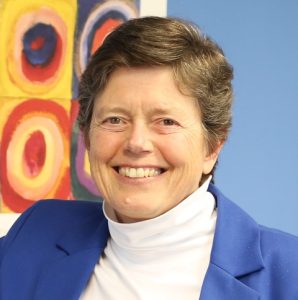 The ASPO Joseph F. Fraumeni, Jr. Distinguished Achievement Award is extended annually to an outstanding scientist in the area of preventive oncology, cancer control, and/or cancer prevention.
The ASPO Joseph F. Fraumeni, Jr. Distinguished Achievement Award is extended annually to an outstanding scientist in the area of preventive oncology, cancer control, and/or cancer prevention.
Joseph W. Cullen Memorial Award
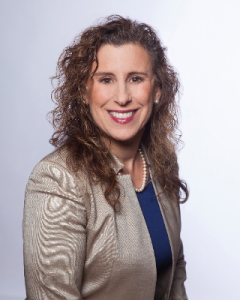 The Joseph W. Cullen Memorial Award aims to appreciate an individual’s distinguished achievement in continued national tobacco control interventions, through research, through the development of prevention and cessation programs with wide-reaching public health impact, or through public policy and advocacy initiatives. Congratulations to this year’s recipient, Bonnie Halpern-Felsher, PhD!
The Joseph W. Cullen Memorial Award aims to appreciate an individual’s distinguished achievement in continued national tobacco control interventions, through research, through the development of prevention and cessation programs with wide-reaching public health impact, or through public policy and advocacy initiatives. Congratulations to this year’s recipient, Bonnie Halpern-Felsher, PhD!
Dr. Halpern-Felsher is an internationally recognized leader in adolescent health and tobacco control whose career reflects exceptional innovation, impact, and dedication to cancer prevention. She is a developmental psychologist and Professor of Pediatrics at Stanford University, where her research has transformed understanding of how cognitive, social, and environmental factors shape youth decision-making and risk perceptions related to tobacco, vaping, cannabis, and other substances.
Dr. Halpern-Felsher has led or co-led multiple landmark NIH-, NCI-, and FDA-funded Tobacco Centers of Regulatory Science (TCORS) projects, producing evidence critical to preventing youth initiation, progression, and continued use of tobacco products, particularly among vulnerable populations. Her work has directly informed prevention strategies and regulatory policy, contributing to major advances in youth tobacco control.
She is also a national leader in translating science into practice. As founder and executive director of the Tobacco Prevention Toolkit, Cannabis Awareness and Prevention Toolkit, and Vaping Information, Solutions, and Interventions Toolkit, Dr. Halpern-Felsher has delivered evidence-based education to more than 3 million youth through thousands of schools across the United States and internationally. These widely adopted curricula have become a standard for prevention education and are continually updated to address emerging industry tactics and trends in youth vaping.
Dr. Halpern-Felsher’s influence extends to policy at the highest levels, including testimony before the FDA, state legislatures, and Congress, and service on Surgeon General Reports and National Academies of Medicine committees. She has mentored more than 300 students and trainees and continues to lead innovative NIH-funded research. Through her sustained leadership in research, policy, and implementation, Dr. Halpern-Felsher exemplifies the legacy of Joseph W. Cullen and is richly deserving of this honor.

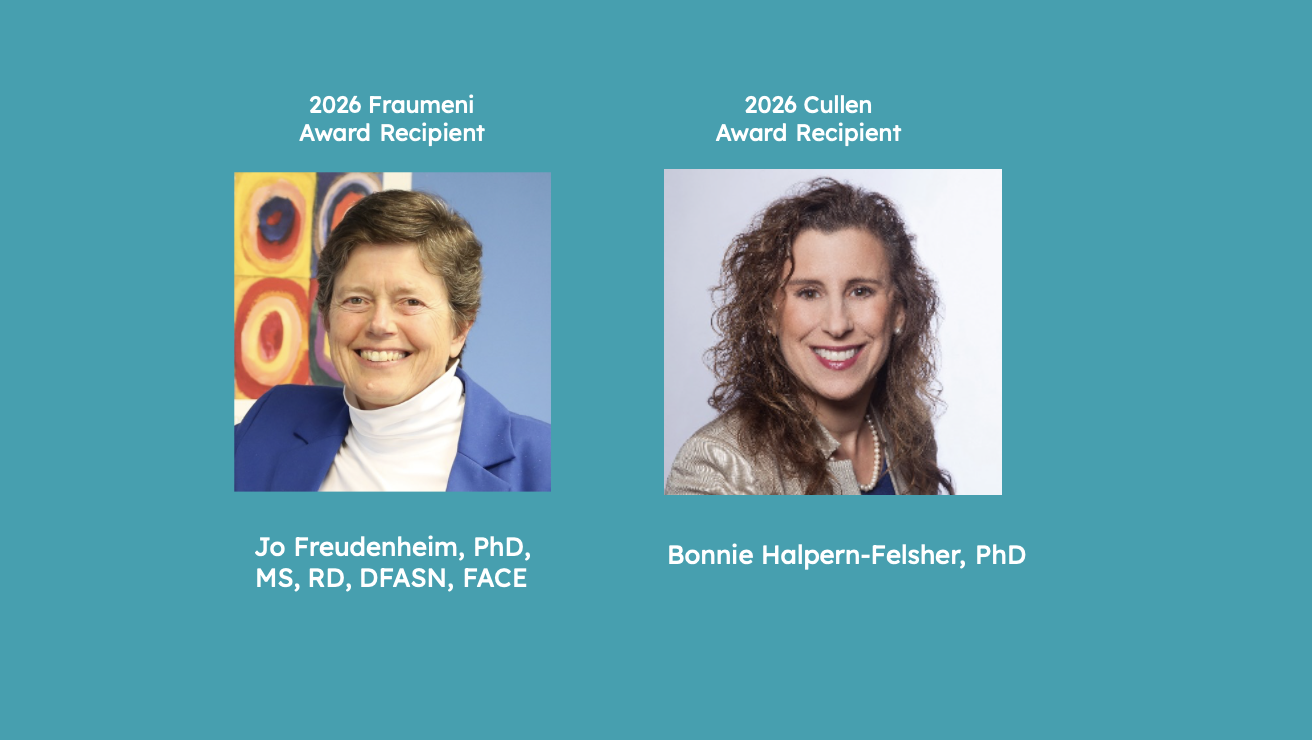
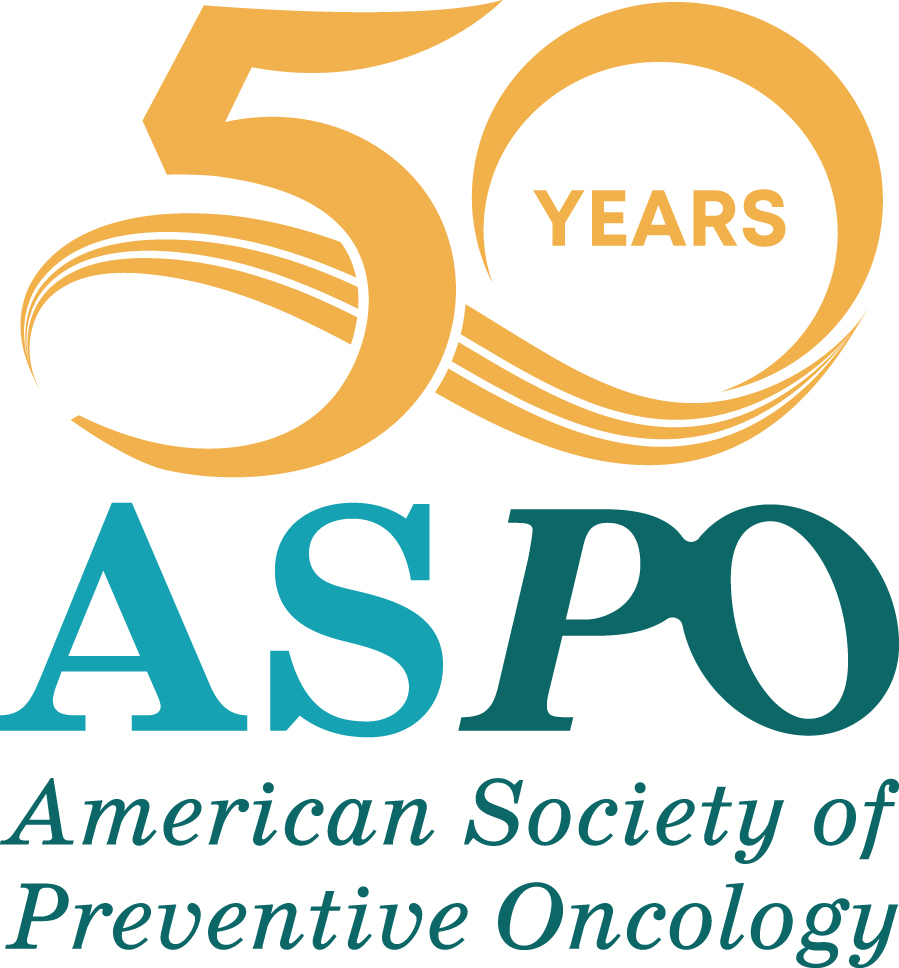
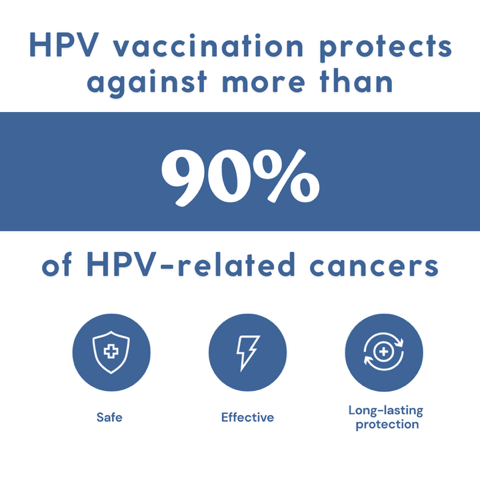

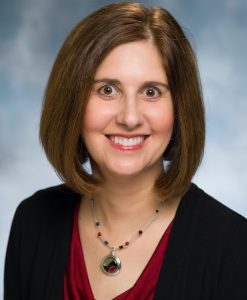
 “In a time of uncertainty in health research, going to ASPO 2025 in Philadelphia, PA felt rejuvenating. This year, I was selected to give a 5-minute flash talk in the session “The Untapped Potential of Lung Cancer Screening”. As a doctoral trainee and first time ASPO attendee, I was nervous about attending this conference with many accomplished cancer researchers. I was instead met with extreme warmth, support and friendliness from fellow attendees – whether it was their first time, or 30th time at ASPO!
“In a time of uncertainty in health research, going to ASPO 2025 in Philadelphia, PA felt rejuvenating. This year, I was selected to give a 5-minute flash talk in the session “The Untapped Potential of Lung Cancer Screening”. As a doctoral trainee and first time ASPO attendee, I was nervous about attending this conference with many accomplished cancer researchers. I was instead met with extreme warmth, support and friendliness from fellow attendees – whether it was their first time, or 30th time at ASPO!
 The ASPO Joseph F. Fraumeni, Jr. Distinguished Achievement Award is extended annually to an outstanding scientist in the area of preventive oncology, cancer control, and/or cancer prevention.
The ASPO Joseph F. Fraumeni, Jr. Distinguished Achievement Award is extended annually to an outstanding scientist in the area of preventive oncology, cancer control, and/or cancer prevention. 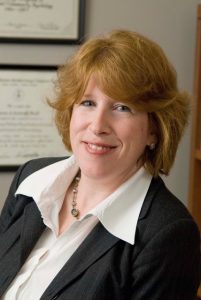 The Joseph W. Cullen Memorial Award aims to appreciate an individual’s distinguished achievement in continued national tobacco control interventions, through
The Joseph W. Cullen Memorial Award aims to appreciate an individual’s distinguished achievement in continued national tobacco control interventions, through 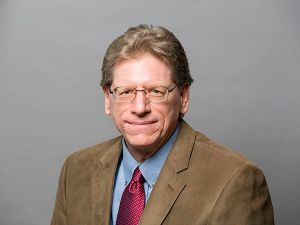 The ASPO Distinguished Service Awards are given periodically to those individuals who have gone above and beyond in their service to the Society. This year, Dr. Henry Ciolino is the recipient of the Distinguished Service Award.
The ASPO Distinguished Service Awards are given periodically to those individuals who have gone above and beyond in their service to the Society. This year, Dr. Henry Ciolino is the recipient of the Distinguished Service Award.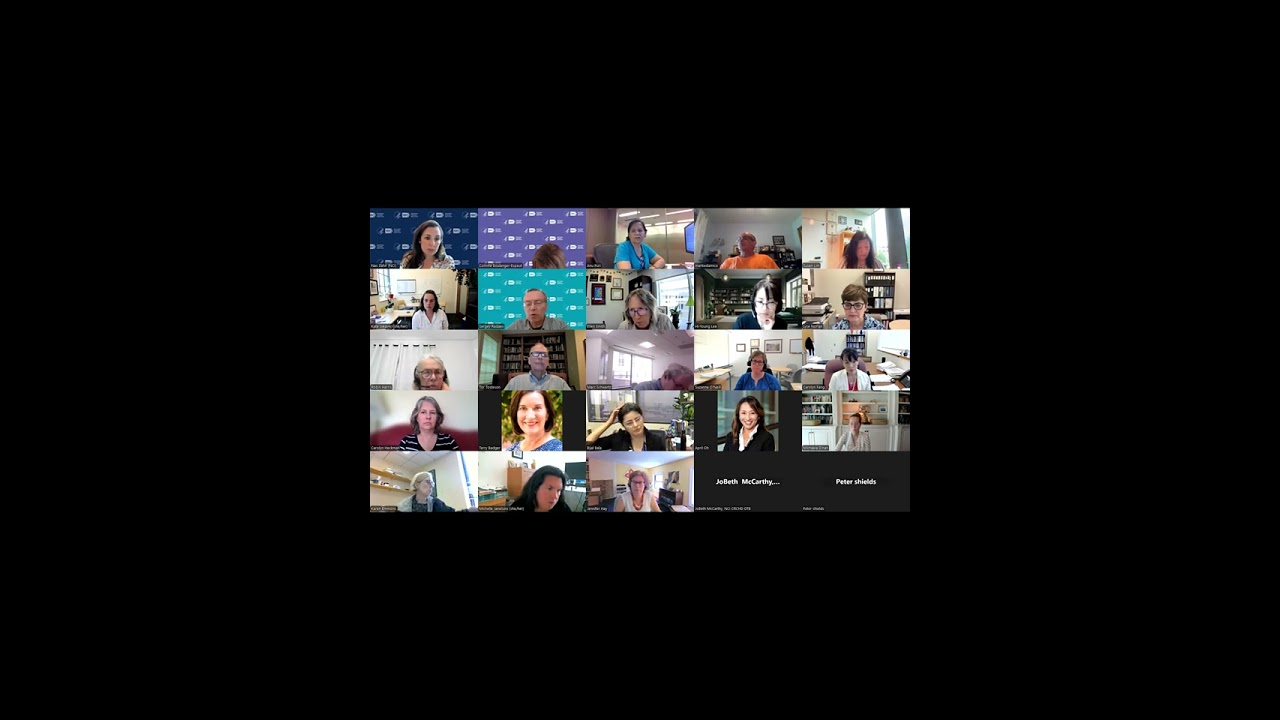
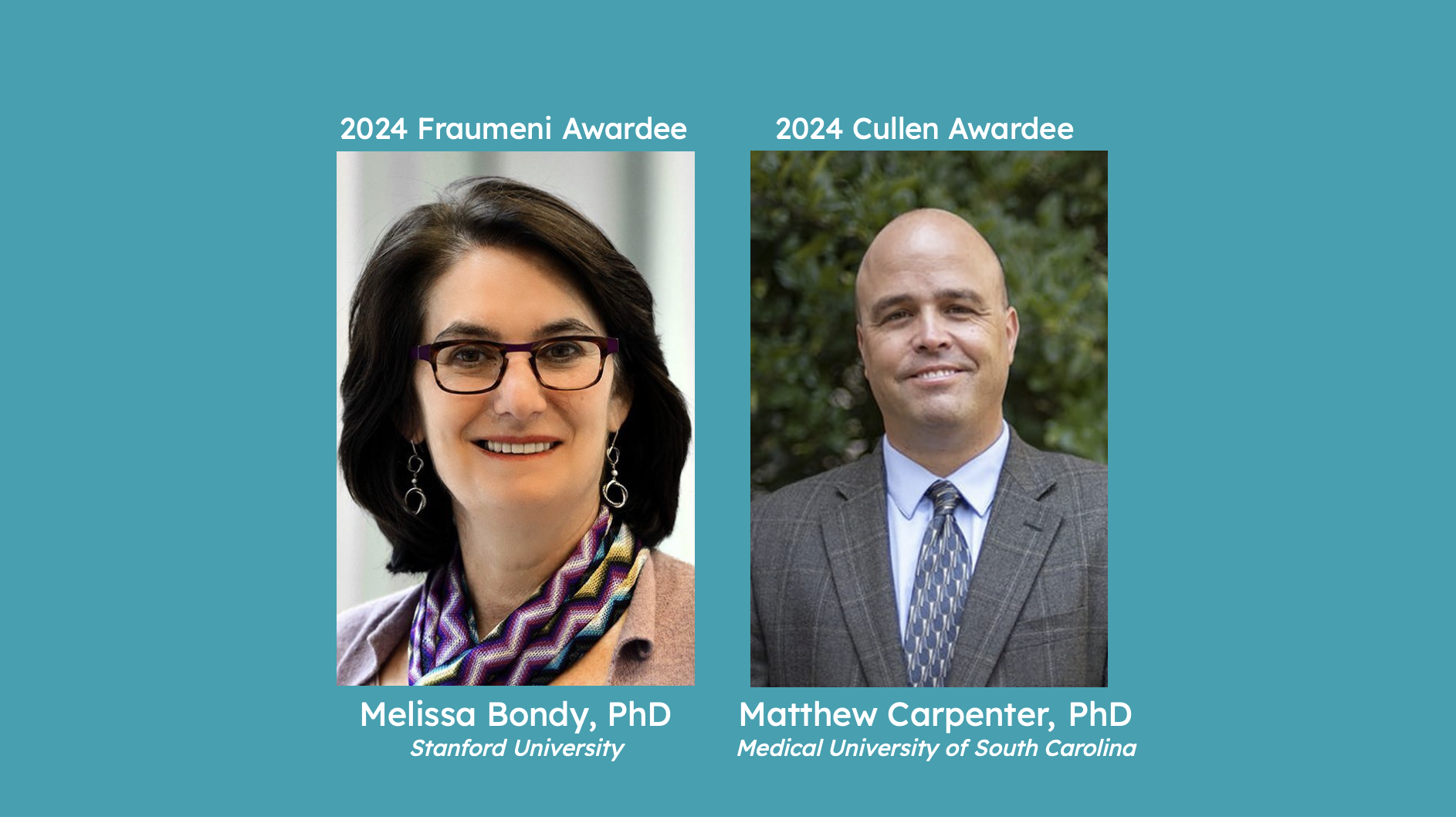
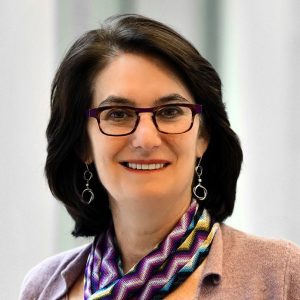 We are thrilled to share that the 2024 Fraumeni Award recipient is Melissa Bondy, Ph.D., of Stanford University! Dr. Bondy earned a Ph.D. in epidemiology from the University of Texas School of Public Health. She then dedicated nearly three decades of her career to the University of Texas MD Anderson Cancer Center and the Baylor College of Medicine, serving as Director of the Childhood Cancer Epidemiology and Prevention Center- a joint center of Baylor College of Medicine, MD Anderson Cancer Center, and Texas Children’s Hospital. Later, she became the Associate Director of Cancer Prevention Sciences at Baylor College of Medicine’s Dan L. Duncan Cancer Center.
We are thrilled to share that the 2024 Fraumeni Award recipient is Melissa Bondy, Ph.D., of Stanford University! Dr. Bondy earned a Ph.D. in epidemiology from the University of Texas School of Public Health. She then dedicated nearly three decades of her career to the University of Texas MD Anderson Cancer Center and the Baylor College of Medicine, serving as Director of the Childhood Cancer Epidemiology and Prevention Center- a joint center of Baylor College of Medicine, MD Anderson Cancer Center, and Texas Children’s Hospital. Later, she became the Associate Director of Cancer Prevention Sciences at Baylor College of Medicine’s Dan L. Duncan Cancer Center.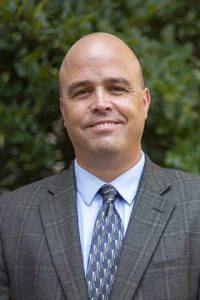 Please join us in congratulating
Please join us in congratulating 
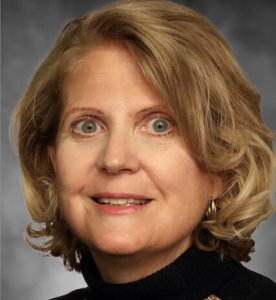 Wendy Demark-Wahnefried, PhD, RD is an outstanding candidate for the ASPO Joseph F. Fraumeni, Jr. Distinguished Achievement Award given her significant and long-term scientific contributions across the cancer continuum. A nutrition scientist by training, Dr. Demark-Wahnefried began her career studying weight gain among women with breast cancer and was one of the first to document sarcopenic obesity with chemotherapy (JCO 2001). She conducted proof-of-principal studies that promoted high-nutrient, low energy density diets combined with aerobic and resistance training to reverse adverse body composition change. Achieving success, Dr. Demark-Wahnefried then focused on interventions that were grounded in behavioral theory, home-based, scalable, and aimed at mitigating outcomes associated with accelerated aging among cancer survivors. Initially using tailored mailed print interventions with or without telephone counseling, the FRESH START and RENEW randomized controlled trials (RCT) achieved significant, reproducible, and durable improvements in dietary intake and physical activity, and functional decline in international and sizable (>500) samples of cancer survivors (JCO 2007, JAMA 2009, JCO 2012). Partnering with Cooperative Extension, Harvest for Health, a statewide, home-based, vegetable gardening intervention delivered by master gardeners paired with 381 older cancer survivors will soon yield findings aimed to enhance health of survivors residing in rural areas. Her AMPLIFY (AiM, Plan and act on LIFestYles) web-based, diet and exercise, weight loss RCT is recruiting survivors of obesity-related cancers. Along with RCTs in the presurgical setting and measuring effects on tumor proliferation have yielded ~350 peer-reviewed articles. She has led efforts to disseminate best practices for lifestyle behaviors among cancer survivors including several notable policy-related papers (CA Cancer J Clin 2012, 2018; Med Sci Sports Exerc, 2010; J Natl Compr Canc Netw 2020,2021; J Clin Oncol 2022). Dr. Demark-Wahnefried is devoted to service, chairing various committees including the National Cancer Policy Forum, the World Cancer Research Fund/American Institute of Cancer Research, and ASPO, where she served on several program planning committees, director-at-large, and president (2013-2015).
Wendy Demark-Wahnefried, PhD, RD is an outstanding candidate for the ASPO Joseph F. Fraumeni, Jr. Distinguished Achievement Award given her significant and long-term scientific contributions across the cancer continuum. A nutrition scientist by training, Dr. Demark-Wahnefried began her career studying weight gain among women with breast cancer and was one of the first to document sarcopenic obesity with chemotherapy (JCO 2001). She conducted proof-of-principal studies that promoted high-nutrient, low energy density diets combined with aerobic and resistance training to reverse adverse body composition change. Achieving success, Dr. Demark-Wahnefried then focused on interventions that were grounded in behavioral theory, home-based, scalable, and aimed at mitigating outcomes associated with accelerated aging among cancer survivors. Initially using tailored mailed print interventions with or without telephone counseling, the FRESH START and RENEW randomized controlled trials (RCT) achieved significant, reproducible, and durable improvements in dietary intake and physical activity, and functional decline in international and sizable (>500) samples of cancer survivors (JCO 2007, JAMA 2009, JCO 2012). Partnering with Cooperative Extension, Harvest for Health, a statewide, home-based, vegetable gardening intervention delivered by master gardeners paired with 381 older cancer survivors will soon yield findings aimed to enhance health of survivors residing in rural areas. Her AMPLIFY (AiM, Plan and act on LIFestYles) web-based, diet and exercise, weight loss RCT is recruiting survivors of obesity-related cancers. Along with RCTs in the presurgical setting and measuring effects on tumor proliferation have yielded ~350 peer-reviewed articles. She has led efforts to disseminate best practices for lifestyle behaviors among cancer survivors including several notable policy-related papers (CA Cancer J Clin 2012, 2018; Med Sci Sports Exerc, 2010; J Natl Compr Canc Netw 2020,2021; J Clin Oncol 2022). Dr. Demark-Wahnefried is devoted to service, chairing various committees including the National Cancer Policy Forum, the World Cancer Research Fund/American Institute of Cancer Research, and ASPO, where she served on several program planning committees, director-at-large, and president (2013-2015). The Joseph W. Cullen Memorial Award is to recognize an individuals distinguished achievement in continued national tobacco control efforts, through research, through the development of prevention and cessation programs with wide-reaching public health impact, or through public policy and advocacy initiatives. We are happy to announce the 2023 award will be presented to
The Joseph W. Cullen Memorial Award is to recognize an individuals distinguished achievement in continued national tobacco control efforts, through research, through the development of prevention and cessation programs with wide-reaching public health impact, or through public policy and advocacy initiatives. We are happy to announce the 2023 award will be presented to 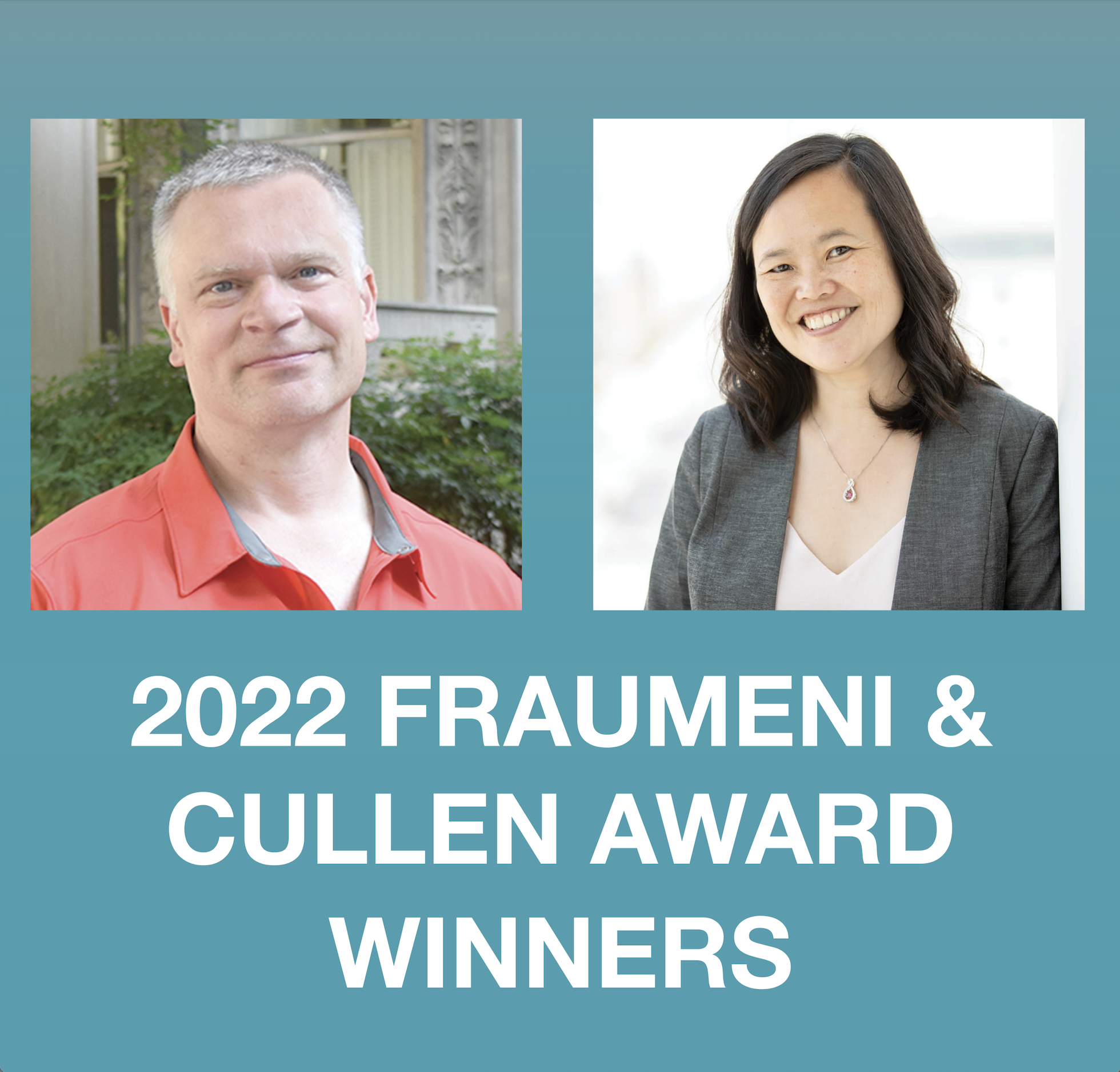
 Dr. Gomez has over 20 years of experience as an epidemiologist with research interests in the role of social determinants of health, including race/ethnicity, socioeconomic status, gender, immigration status, sociocultural factors, and neighborhood contextual characteristics, on health outcomes. She is Director of the Greater Bay Area Cancer Registry, a part of the California Cancer Registry and the NCI Surveillance Epidemiology End Results (SEER) Program. She has contributed surveillance data regarding cancer incidence and outcome patterns and trends for distinct Asian American, Native Hawaiian, and Pacific Islander and Hispanic ethnic groups, as well as cancer patterns by nativity status and neighborhood characteristics. She developed the California Neighborhoods Data System, a compilation of small-area level data on social and built environment characteristics and has used these data in more than a dozen funded studies to evaluate the impact of social and built neighborhood environment factors on disease outcomes. Her publications demonstrating the substantial heterogeneity in cancer patterns across Asian American groups are often cited as the reasons for the importance of disaggregating cancer data for this diverse population. In fact, it is because of Dr. Gomez’ efforts and advocacy that we have gained an appreciation of the substantial heterogeneity among Asians and Pacific Islanders. In addition, she coined the concept of “ethnic enclaves,” which refers to neighborhoods with high proportions of the racial/ethnic group of interest. Through the application of this concept, scientists can assess the role of racial/ethnic enclave neighborhoods as predictors of cancer risk and outcomes. Dr. Gomez’s work in neighborhood contextual research has inspired and motivated a new generation of cancer research and development of novel methodologic approaches for studies in neighborhoods and cancer.
Dr. Gomez has over 20 years of experience as an epidemiologist with research interests in the role of social determinants of health, including race/ethnicity, socioeconomic status, gender, immigration status, sociocultural factors, and neighborhood contextual characteristics, on health outcomes. She is Director of the Greater Bay Area Cancer Registry, a part of the California Cancer Registry and the NCI Surveillance Epidemiology End Results (SEER) Program. She has contributed surveillance data regarding cancer incidence and outcome patterns and trends for distinct Asian American, Native Hawaiian, and Pacific Islander and Hispanic ethnic groups, as well as cancer patterns by nativity status and neighborhood characteristics. She developed the California Neighborhoods Data System, a compilation of small-area level data on social and built environment characteristics and has used these data in more than a dozen funded studies to evaluate the impact of social and built neighborhood environment factors on disease outcomes. Her publications demonstrating the substantial heterogeneity in cancer patterns across Asian American groups are often cited as the reasons for the importance of disaggregating cancer data for this diverse population. In fact, it is because of Dr. Gomez’ efforts and advocacy that we have gained an appreciation of the substantial heterogeneity among Asians and Pacific Islanders. In addition, she coined the concept of “ethnic enclaves,” which refers to neighborhoods with high proportions of the racial/ethnic group of interest. Through the application of this concept, scientists can assess the role of racial/ethnic enclave neighborhoods as predictors of cancer risk and outcomes. Dr. Gomez’s work in neighborhood contextual research has inspired and motivated a new generation of cancer research and development of novel methodologic approaches for studies in neighborhoods and cancer.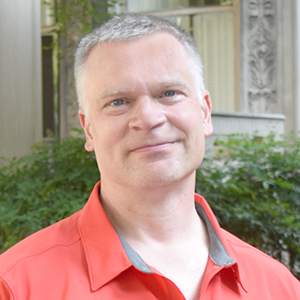 Dr. Eissenberg began exploring methods to assess the effects of novel tobacco products in 1999, was the first to publish a clinical lab study of e-cigarette effects (Eissenberg, 2010), and the Center for the Study of Tobacco Products (CSTP) team at Virginia Commonwealth University, which Dr. Eissenberg co-directs, was the first to characterize the product characteristics, toxicant output, and nicotine delivery of JUUL e-cigarettes. Dr. Eissenberg’s significant achievements in national and international tobacco control are evidenced by 200+ publications in the past 8 years from members of the CSTP scientific team he leads. Over the past two decades, Dr. Eissenberg has been awarded over $50 million dollars in funds as principal investigator from the National Institutes of Health (NIH) to study tobacco products and has been funded continuously by NIH since 1997. He has nearly 300 publications, predominantly in the area of tobacco control, his h-index on Google scholar is 76, and he is recognized by Clarivate as a Highly Cited Researcher due to having multiple highly-cited papers that rank in the top 1% in Web of Science. Dr. Eissenberg is distinguished by his leadership in bringing together national and international scientists from chemistry, economics, engineering, medicine, public policy, public health, and psychology to generate high-impact and transformative transdisciplinary tobacco regulatory science that can impact federal policy on tobacco products. He has dedicated his career to facilitating safe and ethical research aimed at decreasing tobacco-caused death and disease as a past member of the FDA’s Tobacco Product Scientific Advisory Committee and of the DHHS Secretary’s Advisory Committee on Human Research Protections. Findings from his work are providing the scientific justification for several tobacco control regulatory policies under consideration including efforts to address menthol flavoring in e-liquids and regulating nicotine emissions from e-cigarette devices. In addition, he has been a generous educator who has mentored numerous junior faculty, postdoctoral fellows and graduate students, 9 of whom have competed successfully for NIH F31 funding.
Dr. Eissenberg began exploring methods to assess the effects of novel tobacco products in 1999, was the first to publish a clinical lab study of e-cigarette effects (Eissenberg, 2010), and the Center for the Study of Tobacco Products (CSTP) team at Virginia Commonwealth University, which Dr. Eissenberg co-directs, was the first to characterize the product characteristics, toxicant output, and nicotine delivery of JUUL e-cigarettes. Dr. Eissenberg’s significant achievements in national and international tobacco control are evidenced by 200+ publications in the past 8 years from members of the CSTP scientific team he leads. Over the past two decades, Dr. Eissenberg has been awarded over $50 million dollars in funds as principal investigator from the National Institutes of Health (NIH) to study tobacco products and has been funded continuously by NIH since 1997. He has nearly 300 publications, predominantly in the area of tobacco control, his h-index on Google scholar is 76, and he is recognized by Clarivate as a Highly Cited Researcher due to having multiple highly-cited papers that rank in the top 1% in Web of Science. Dr. Eissenberg is distinguished by his leadership in bringing together national and international scientists from chemistry, economics, engineering, medicine, public policy, public health, and psychology to generate high-impact and transformative transdisciplinary tobacco regulatory science that can impact federal policy on tobacco products. He has dedicated his career to facilitating safe and ethical research aimed at decreasing tobacco-caused death and disease as a past member of the FDA’s Tobacco Product Scientific Advisory Committee and of the DHHS Secretary’s Advisory Committee on Human Research Protections. Findings from his work are providing the scientific justification for several tobacco control regulatory policies under consideration including efforts to address menthol flavoring in e-liquids and regulating nicotine emissions from e-cigarette devices. In addition, he has been a generous educator who has mentored numerous junior faculty, postdoctoral fellows and graduate students, 9 of whom have competed successfully for NIH F31 funding.